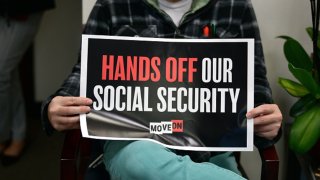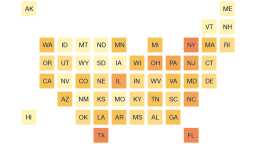Public workers may receive reduced Social Security benefits. There's growing support in Congress to change that
By Lorie Konish | CNBC •

Araya Doheny | Getty Images
Public workers may receive reduced Social Security benefits. There’s growing support in Congress to change that
Workers may have jobs where they pay into Social Security or earn pension benefits.
When they have both, their Social Security benefits may be adjusted to reflect that.
There's growing support in Congress to either revise those rules or eliminate them altogether.
When Dave Bernstein, 87, started working at the U.S. Postal Service in February 1970, he was making $2.35 an hour.
To supplement his income, he also took on other work. Years later, Bernstein decided in 1992 to take a voluntary retirement.
"We knew there was going to be a reduced pension because of the early out," said Phyllis Bernstein, Dave's wife, who is 84.
But what came next was something the couple did not expect.
While Dave was expecting a monthly Social Security check of around $800, it ended up being just about half that amount – around $415 – even though he had earned the required 40 credits to be fully insured by the program. The benefits were adjusted based on rules for workers who earn both pension and Social Security benefits.
The couple, who reside in Tampa, Florida, have had a different retirement than they envisioned due to the lower income.
Phyllis kept working until she was 82. They have also turned to family for financial support.
Their lifestyle is frugal, with home-cooked meals and cars they kept for 20 years, or "until the wheels were falling off," the couple jokes.
But their limited resources have made traveling to Australia and New Zealand – Phyllis' dream – out of reach.
"When he retired, I was working," Phyllis said. "We just couldn't do the travel."
Today, Dave is pushing for the Social Security rules that reduced his benefits to be changed.
His union, the American Postal Workers Union, has endorsed the Social Security Fairness Act, a bill proposed in Congress that would repeal Social Security rules known as the Windfall Elimination Provision, or WEP, and Government Pension Offset, or GPO, that reduce benefits for workers had positions where they did not pay Social Security taxes, also called non-covered earnings.
The legislation has support from other organizations that represent public workers, including teachers, firefighters and police.
The bill has overwhelming bipartisan support in the House of Representatives – 300 co-sponsors – at a time when that chamber has been politically divided. That support recently prompted House lawmakers to send a letter to leaders of the Ways and Means Committee to request a hearing.
The Social Security Fairness Act has also been introduced in the Senate, with support from 49 leaders from both sides of the aisle.
Yet some experts say just getting rid of the rules may not be the most effective way of making the system fairer.
How the WEP, GPO rules work
The WEP applies to how retirement or disability benefits are calculated if a worker earned a retirement or disability pension from an employer who did not withhold Social Security taxes and qualifies for Social Security from work in other jobs where they did pay taxes into the program.
Social Security benefits are calculated using a worker's average indexed monthly earnings, and then using a formula to calculate a worker's basic benefit amount. For workers affected by the WEP, part of the replacement rate for the average indexed monthly earnings is brought down to 40% from 90%.
The GPO, meanwhile, reduces benefits for spouses and widows or widowers of recipients of retirement or disability pensions from local, state or federal governments.
Under the GPO, Social Security benefits are reduced by two-thirds of the government pension. If two-thirds of the government pension is more than the Social Security benefit, the Social Security benefit may be zero.
The impact of the rules is far-reaching, according to Edward Kelly, general president of the International Association of Fire Fighters. Many firefighters work in second jobs in the private sector as cab drivers, bartenders or truck drivers, where they earn credits toward Social Security.
"They steal their money, because they're also public employees," said Kelly, who describes his union members as "passionately angry" about the issue.
"It affects hundreds of thousands, if not millions of public employees that paid into Social Security and essentially are being penalized because they also happen to be public servants, whether they are teachers, cops and, obviously, firefighters," Kelly said.
Why experts say another fix may be better
The WEP and GPO rules were intended to make it so workers who pay Social Security taxes for their entire careers are treated the same as those who do not.
But under those current rules, some beneficiaries receive lower benefits than they would have if they paid into Social Security for all of their careers, while others receive higher benefits, according to the Bipartisan Policy Center.
Yet repealing the WEP and GPO rules would result in Social Security benefits that are "overly generous" for non-covered workers, research has found.
Part of what may create that advantage is that Social Security benefits are progressive, and therefore replace a larger share of income for lower earners. So someone who only has part of their salary history in Social Security may get a higher replacement rate without considering their pension income.
Fully repealing the WEP and GPO rules may also come with higher costs at a time when the program facing a funding shortfall. The change would add an estimated $150 billion to the program's costs in the next 10 years, according to the Center on Budget and Policy Priorities.
Another way of handling the disparity may be to create a proportional approach to income replacement. Instead of the WEP, workers' benefits would be calculated based on all of their earnings and then adjusted to reflect the share of their careers that were in jobs covered by Social Security. A similar approach may be taken with the GPO.
Certain bills on Capitol Hill propose a proportional approach.
However, a proportional formula may not solve all the inequities in the current system, according to Emerson Sprick, senior economic analyst at the Bipartisan Policy Center, which has prompted to think tank to work on refining its proposal.
'Extremely complex' to understand
An important advantage to reforming the current formulas would be making it easier for workers to understand and plan for their retirements.
"It is definitely extremely complex, and very hard for folks preparing for retirement or in retirement, to understand what it means for their benefits," Sprick said.
Social Security statements that provide retirement benefit estimates do not take these rules into account.
Consequently, many workers find out their benefits are adjusted when they are about to retire.
Public workers may receive reduced Social Security benefits. There’s growing support in Congress to change that
Workers may have jobs where they pay into Social Security or earn pension benefits.
When they have both, their Social Security benefits may be adjusted to reflect that.
There's growing support in Congress to either revise those rules or eliminate them altogether.
When Dave Bernstein, 87, started working at the U.S. Postal Service in February 1970, he was making $2.35 an hour.
To supplement his income, he also took on other work. Years later, Bernstein decided in 1992 to take a voluntary retirement.
"We knew there was going to be a reduced pension because of the early out," said Phyllis Bernstein, Dave's wife, who is 84.
But what came next was something the couple did not expect.
While Dave was expecting a monthly Social Security check of around $800, it ended up being just about half that amount – around $415 – even though he had earned the required 40 credits to be fully insured by the program. The benefits were adjusted based on rules for workers who earn both pension and Social Security benefits.
The couple, who reside in Tampa, Florida, have had a different retirement than they envisioned due to the lower income.
Phyllis kept working until she was 82. They have also turned to family for financial support.
Their lifestyle is frugal, with home-cooked meals and cars they kept for 20 years, or "until the wheels were falling off," the couple jokes.
But their limited resources have made traveling to Australia and New Zealand – Phyllis' dream – out of reach.
"When he retired, I was working," Phyllis said. "We just couldn't do the travel."
Today, Dave is pushing for the Social Security rules that reduced his benefits to be changed.
His union, the American Postal Workers Union, has endorsed the Social Security Fairness Act, a bill proposed in Congress that would repeal Social Security rules known as the Windfall Elimination Provision, or WEP, and Government Pension Offset, or GPO, that reduce benefits for workers had positions where they did not pay Social Security taxes, also called non-covered earnings.
The legislation has support from other organizations that represent public workers, including teachers, firefighters and police.
The bill has overwhelming bipartisan support in the House of Representatives – 300 co-sponsors – at a time when that chamber has been politically divided. That support recently prompted House lawmakers to send a letter to leaders of the Ways and Means Committee to request a hearing.
The Social Security Fairness Act has also been introduced in the Senate, with support from 49 leaders from both sides of the aisle.
Yet some experts say just getting rid of the rules may not be the most effective way of making the system fairer.
How the WEP, GPO rules work
The WEP applies to how retirement or disability benefits are calculated if a worker earned a retirement or disability pension from an employer who did not withhold Social Security taxes and qualifies for Social Security from work in other jobs where they did pay taxes into the program.
Social Security benefits are calculated using a worker's average indexed monthly earnings, and then using a formula to calculate a worker's basic benefit amount. For workers affected by the WEP, part of the replacement rate for the average indexed monthly earnings is brought down to 40% from 90%.
The GPO, meanwhile, reduces benefits for spouses and widows or widowers of recipients of retirement or disability pensions from local, state or federal governments.
Under the GPO, Social Security benefits are reduced by two-thirds of the government pension. If two-thirds of the government pension is more than the Social Security benefit, the Social Security benefit may be zero.
The impact of the rules is far-reaching, according to Edward Kelly, general president of the International Association of Fire Fighters. Many firefighters work in second jobs in the private sector as cab drivers, bartenders or truck drivers, where they earn credits toward Social Security.
"They steal their money, because they're also public employees," said Kelly, who describes his union members as "passionately angry" about the issue.
"It affects hundreds of thousands, if not millions of public employees that paid into Social Security and essentially are being penalized because they also happen to be public servants, whether they are teachers, cops and, obviously, firefighters," Kelly said.
Why experts say another fix may be better
The WEP and GPO rules were intended to make it so workers who pay Social Security taxes for their entire careers are treated the same as those who do not.
But under those current rules, some beneficiaries receive lower benefits than they would have if they paid into Social Security for all of their careers, while others receive higher benefits, according to the Bipartisan Policy Center.
Yet repealing the WEP and GPO rules would result in Social Security benefits that are "overly generous" for non-covered workers, research has found.
Part of what may create that advantage is that Social Security benefits are progressive, and therefore replace a larger share of income for lower earners. So someone who only has part of their salary history in Social Security may get a higher replacement rate without considering their pension income.
Fully repealing the WEP and GPO rules may also come with higher costs at a time when the program facing a funding shortfall. The change would add an estimated $150 billion to the program's costs in the next 10 years, according to the Center on Budget and Policy Priorities.
Another way of handling the disparity may be to create a proportional approach to income replacement. Instead of the WEP, workers' benefits would be calculated based on all of their earnings and then adjusted to reflect the share of their careers that were in jobs covered by Social Security. A similar approach may be taken with the GPO.
Certain bills on Capitol Hill propose a proportional approach.
However, a proportional formula may not solve all the inequities in the current system, according to Emerson Sprick, senior economic analyst at the Bipartisan Policy Center, which has prompted to think tank to work on refining its proposal.
'Extremely complex' to understand
An important advantage to reforming the current formulas would be making it easier for workers to understand and plan for their retirements.
"It is definitely extremely complex, and very hard for folks preparing for retirement or in retirement, to understand what it means for their benefits," Sprick said.
Social Security statements that provide retirement benefit estimates do not take these rules into account.
Consequently, many workers find out their benefits are adjusted when they are about to retire.

shapecharge | E+ | Getty Images
"The young guys don't pay attention to it because it's too far out; they're not worried about it," Kelly said of the firefighters.
"It's not until you're ready to go out the door that you actually start paying attention to what you're going to have to live off when you actually retire," he added.
The reductions to their Social Security benefits can be a shock.
For beneficiaries like the Bernsteins who start out with lower benefits, it can be difficult to catch up, even after a record 8.7% Social Security cost-of-living adjustments went into effect this year.
"Gas this summer and in the spring at $4 a gallon ate that money up like it wasn't even there," Dave Bernstein said.
"The young guys don't pay attention to it because it's too far out; they're not worried about it," Kelly said of the firefighters.
"It's not until you're ready to go out the door that you actually start paying attention to what you're going to have to live off when you actually retire," he added.
The reductions to their Social Security benefits can be a shock.
For beneficiaries like the Bernsteins who start out with lower benefits, it can be difficult to catch up, even after a record 8.7% Social Security cost-of-living adjustments went into effect this year.
"Gas this summer and in the spring at $4 a gallon ate that money up like it wasn't even there," Dave Bernstein said.
This federal program that helps 2 in 5 babies may have to turn away families if Congress doesn’t act
By Tami Luhby, CNN
Sun November 12, 2023

Enrollment in WIC, which provides food assistance to pregnant women, new moms and young children, is rising.Allison Dinner/AP
CNN —
Without a little aid from the federal government, Whitley Hasty would have a tougher time buying the fresh broccoli her toddler son loves to eat with ranch dressing.
Hasty receives WIC, the food assistance program for low-income women, infants and young children. It has helped her purchase milk, cheese, juice, eggs, fruits, vegetables and other staples for 3-year-old Leni – a benefit that has been even more vital in recent years as the price of groceries and other necessities has soared.
In addition, a WIC staffer encouraged her to breastfeed both Leni and her daughter, Emilia, 9, when they were infants, connecting Hasty with peer counseling for extra support. And the program set her up with a nutritionist, who provides her with healthy recipes that have broadened the variety of food the children eat.
Ad Feedback

WIC has provided Whitley Hasty, left, with more than just assistance buying food for her two children.Jane Grant
“It’s huge,” said Hasty, who works as a benefits navigation coordinator for a regional food bank, helping other families sign up for WIC and food stamps. “It’s more than just the benefits that you get every month that helps me financially.”
But WIC, formally known as the Special Supplemental Nutrition Program for Women, Infants, and Children, may soon have to start putting eligible families on waitlists if Congress doesn’t increase its funding. Enrollment in the program has soared in recent months, hitting just under 7 million people in August, up from fewer than 6.4 million folks a year earlier.
Though WIC has long enjoyed bipartisan support, the additional money is far from guaranteed. Even before the jump in participation, a battle was brewing on Capitol Hill over the program’s appropriation for fiscal year 2024. And now lawmakers are racing to come up with a plan to fund federal agencies beyond November 17 or the government will shut down.
House Republicans, who are intent on slashing spending, have proposed reducing WIC funding to $5.5 billion, which would be $185 million less than last year’s level and $800 million less than the Senate’s appropriations bill would provide.
The House would also cut back the program’s enhanced fruits and vegetables benefit, which was initially authorized by the Democrats’ American Rescue Plan Act in 2021 and then renewed with bipartisan support in subsequent appropriations bills. Enrollees would receive between $11 and $15 a month to purchase fresh produce in fiscal year 2024, down from $25 to $49.
The enrollment surge prompted the Biden administration in late August to request an additional $1.4 billion to meet the increased demand. Without more money, 600,000 eligible new moms and young children could be turned away, according to the Center on Budget and Policy Priorities, a left-leaning research group.
Soaring interest
While WIC has reached only about half of those eligible in recent years, it can have a meaningful impact on enrollees.
About 2 in 5 babies born in the US in 2022 benefited from WIC, according to Noura Insolera, assistant research scientist at the University of Michigan’s Institute for Social Research. Children who received WIC and food stamps were less likely to be food insecure as young adults living on their own, she said.
There are several reasons why WIC is becoming more popular.
Federal and state policymakers have made it easier to enroll and recertify, improved the shopping experience and enhanced the benefits. Also, skyrocketing inflation, particularly for food, has squeezed the budgets of many Americans, especially low-income families.

4 charts show who will be hit the hardest as pandemic-era benefits end
Plus, the multitude of temporary Covid-19 pandemic relief programs – including the enhanced child tax credit, stimulus checks and, in particular, more generous food stamp benefits – have largely ended. These measures made Americans more aware of the ongoing government assistance that may be available to them.
“There’s more knowledge now about the ways in which the other public safety-net programs could kind of step in and fill that gap,” Insolera said.
The relief efforts temporarily improved children’s well-being. But last year, poverty and food insecurity among the nation’s youngest residents climbed. This setback underscores the importance of WIC, said Georgia Machell, interim CEO of the National WIC Association.
“This should actually be a really happy moment for the program because caseload is going up,” Machell said, noting that WIC celebrates its 50th anniversary in January. “And it’s just really bittersweet because folks have been working really hard to increase caseload. We’re seeing that increase happen now, but we just don’t have sufficient funding.”
Participating in WIC has helped Emily Church cope with inflation as she and her husband raise their daughter, Myles Mae, 3. On a recent trip to the supermarket, the benefits reduced her bill from $180 to $140, covering the cost of the milk, fruit and vegetables she picked up.
The assistance means the couple doesn’t have to juggle paying for gas, electricity and food.
“It makes a huge difference in our food budget on a monthly basis,” said Church, an Athens, Ohio, resident who works as the sales manager at Snowville Creamery, a local company that produces milk, yogurt and cheese.

WIC helps Emily Church afford food for her daughter, Myles Mae.Courtesy Emily Church
While she’s concerned that she could lose the benefit, Church is more angry that lawmakers may not fully fund the program and may force expectant and new moms onto waitlists.
“I just want our government to get it together. These are our women, our infants, our children in our country,” Church said. “The program was designed to take care of these people. And now we’re saying … ‘You’re coming for help? No, sorry. Here’s a waiting list.’ How do we do that? That’s crazy.”
By Tami Luhby, CNN
Sun November 12, 2023

Enrollment in WIC, which provides food assistance to pregnant women, new moms and young children, is rising.Allison Dinner/AP
CNN —
Without a little aid from the federal government, Whitley Hasty would have a tougher time buying the fresh broccoli her toddler son loves to eat with ranch dressing.
Hasty receives WIC, the food assistance program for low-income women, infants and young children. It has helped her purchase milk, cheese, juice, eggs, fruits, vegetables and other staples for 3-year-old Leni – a benefit that has been even more vital in recent years as the price of groceries and other necessities has soared.
In addition, a WIC staffer encouraged her to breastfeed both Leni and her daughter, Emilia, 9, when they were infants, connecting Hasty with peer counseling for extra support. And the program set her up with a nutritionist, who provides her with healthy recipes that have broadened the variety of food the children eat.
Ad Feedback

WIC has provided Whitley Hasty, left, with more than just assistance buying food for her two children.Jane Grant
“It’s huge,” said Hasty, who works as a benefits navigation coordinator for a regional food bank, helping other families sign up for WIC and food stamps. “It’s more than just the benefits that you get every month that helps me financially.”
But WIC, formally known as the Special Supplemental Nutrition Program for Women, Infants, and Children, may soon have to start putting eligible families on waitlists if Congress doesn’t increase its funding. Enrollment in the program has soared in recent months, hitting just under 7 million people in August, up from fewer than 6.4 million folks a year earlier.
Though WIC has long enjoyed bipartisan support, the additional money is far from guaranteed. Even before the jump in participation, a battle was brewing on Capitol Hill over the program’s appropriation for fiscal year 2024. And now lawmakers are racing to come up with a plan to fund federal agencies beyond November 17 or the government will shut down.
House Republicans, who are intent on slashing spending, have proposed reducing WIC funding to $5.5 billion, which would be $185 million less than last year’s level and $800 million less than the Senate’s appropriations bill would provide.
The House would also cut back the program’s enhanced fruits and vegetables benefit, which was initially authorized by the Democrats’ American Rescue Plan Act in 2021 and then renewed with bipartisan support in subsequent appropriations bills. Enrollees would receive between $11 and $15 a month to purchase fresh produce in fiscal year 2024, down from $25 to $49.
The enrollment surge prompted the Biden administration in late August to request an additional $1.4 billion to meet the increased demand. Without more money, 600,000 eligible new moms and young children could be turned away, according to the Center on Budget and Policy Priorities, a left-leaning research group.
Soaring interest
While WIC has reached only about half of those eligible in recent years, it can have a meaningful impact on enrollees.
About 2 in 5 babies born in the US in 2022 benefited from WIC, according to Noura Insolera, assistant research scientist at the University of Michigan’s Institute for Social Research. Children who received WIC and food stamps were less likely to be food insecure as young adults living on their own, she said.
There are several reasons why WIC is becoming more popular.
Federal and state policymakers have made it easier to enroll and recertify, improved the shopping experience and enhanced the benefits. Also, skyrocketing inflation, particularly for food, has squeezed the budgets of many Americans, especially low-income families.

4 charts show who will be hit the hardest as pandemic-era benefits end
Plus, the multitude of temporary Covid-19 pandemic relief programs – including the enhanced child tax credit, stimulus checks and, in particular, more generous food stamp benefits – have largely ended. These measures made Americans more aware of the ongoing government assistance that may be available to them.
“There’s more knowledge now about the ways in which the other public safety-net programs could kind of step in and fill that gap,” Insolera said.
The relief efforts temporarily improved children’s well-being. But last year, poverty and food insecurity among the nation’s youngest residents climbed. This setback underscores the importance of WIC, said Georgia Machell, interim CEO of the National WIC Association.
“This should actually be a really happy moment for the program because caseload is going up,” Machell said, noting that WIC celebrates its 50th anniversary in January. “And it’s just really bittersweet because folks have been working really hard to increase caseload. We’re seeing that increase happen now, but we just don’t have sufficient funding.”
Participating in WIC has helped Emily Church cope with inflation as she and her husband raise their daughter, Myles Mae, 3. On a recent trip to the supermarket, the benefits reduced her bill from $180 to $140, covering the cost of the milk, fruit and vegetables she picked up.
The assistance means the couple doesn’t have to juggle paying for gas, electricity and food.
“It makes a huge difference in our food budget on a monthly basis,” said Church, an Athens, Ohio, resident who works as the sales manager at Snowville Creamery, a local company that produces milk, yogurt and cheese.

WIC helps Emily Church afford food for her daughter, Myles Mae.Courtesy Emily Church
While she’s concerned that she could lose the benefit, Church is more angry that lawmakers may not fully fund the program and may force expectant and new moms onto waitlists.
“I just want our government to get it together. These are our women, our infants, our children in our country,” Church said. “The program was designed to take care of these people. And now we’re saying … ‘You’re coming for help? No, sorry. Here’s a waiting list.’ How do we do that? That’s crazy.”
No comments:
Post a Comment